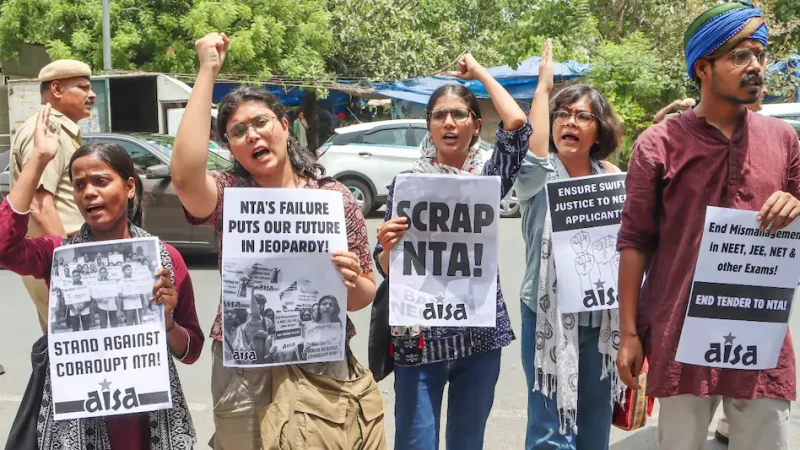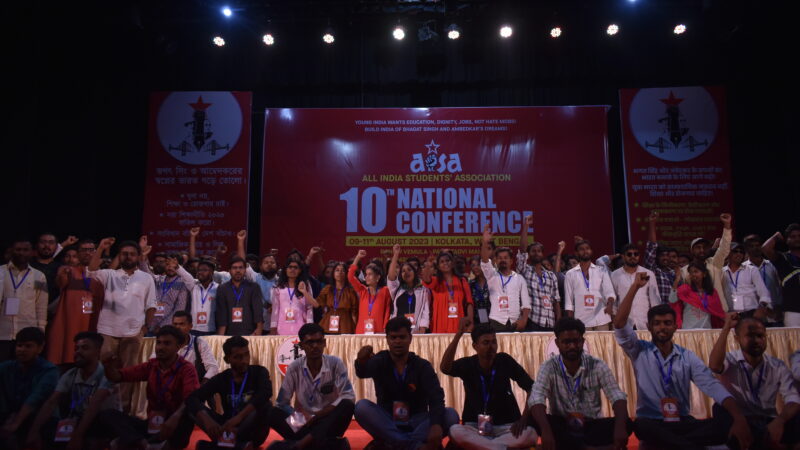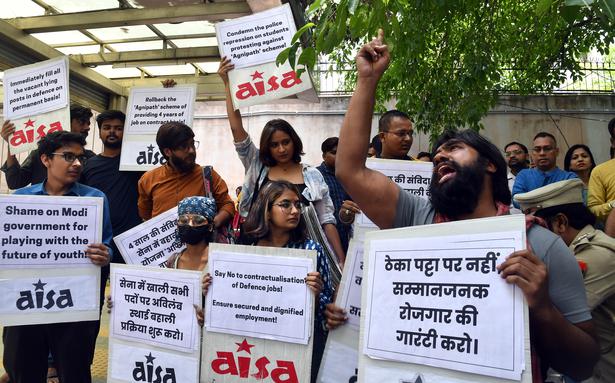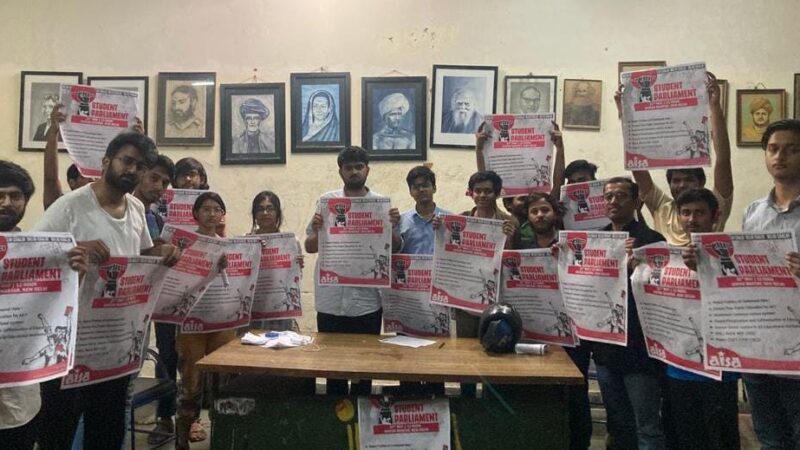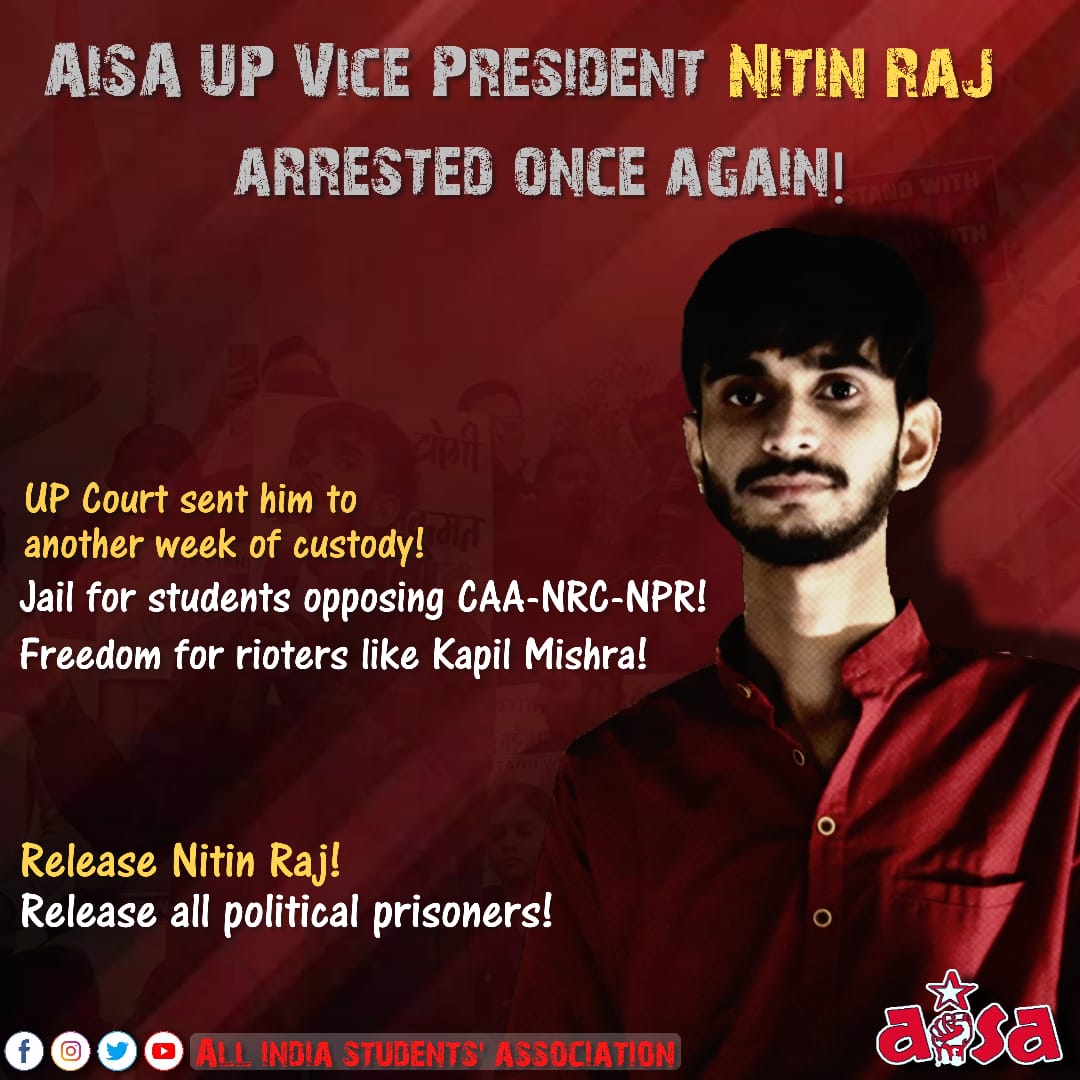Exploring Democracy, Reclaiming the Republic – II
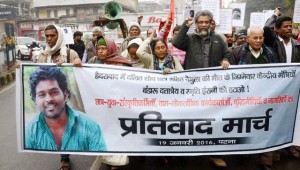 Today, as we continue to demand action against those responsible for Rohith Vemula’s institutional murder, the horrific news of 3 more suicides reached us. Three women students committed suicide in Tamil Nadu, driven to despair and death by the massive fees charged by private education “shops” masquerading as colleges. Across the country, students have been protesting against fee hikes and privatisation of education. And now, 3 women students, bearing the brunt of this mercenary commercialisation, have chosen to kill themselves to draw the country’s attention.
Today, as we continue to demand action against those responsible for Rohith Vemula’s institutional murder, the horrific news of 3 more suicides reached us. Three women students committed suicide in Tamil Nadu, driven to despair and death by the massive fees charged by private education “shops” masquerading as colleges. Across the country, students have been protesting against fee hikes and privatisation of education. And now, 3 women students, bearing the brunt of this mercenary commercialisation, have chosen to kill themselves to draw the country’s attention.
It is now one week since Rohith Vemula died. His tragic death brought to the fore several crucial questions. It exposed, once again, the brutal and savage existence of institutionalised discrimination and alienation that Dalit students routinely face in educational institutions. It also tragically highlighted the dangers and deadly consequences of the Modi government’s blatant misuse of institutional power to further its partisan agenda. It is precisely these issues that Rohith and several others across the country had been raising for several weeks. It is indeed a sign of our times that it took a tragic death for these concerns to be highlighted in the mainstream discourse.
We live in times where institutions are being systematically and strategically used to impose the agenda of the RSS-BJP. The official platforms as well as the academic credibility of institutions such as JNU, DU, ICHR or the Indian Science Congress are being blatantly used to further the RSS’s hate project of “cultural nationalism”, Hindu Rashtra and communal division. And as the entire sequence of events leading to Rohith’s death points out, the state machinery and institutional power were being used to target, criminalise and victimise any possible dissent. In the RSS-ABVP dictionary, to differ with the RSS-BJP is to become “anti-national” and “extremist”, and to raise the issue of caste discrimination in Hinduism is to be “casteist”. The very act of political difference and dissent has now officially become sedition. So, Rohith and his friends can be socially boycotted in HCU, and Sandeep Pandey can be kicked out from his job in BHU for his “anti-national” views!
As we approach yet another 26 December, let us reflect upon the challenges before us to achieve Babasaheb Ambedkar’s vision of social, political and economic equality. Today, the RSS-BJP is forced by its political compulsions to try and appropriate Ambedkar’s legacy. This process of appropriation however inevitably runs into trouble, as Ambedkar’s ideas and ideology clash with the RSS’s notion of “cultural nationalism”. Time and again, RSS chief Mohan Bhagwat talks about the need to “review” caste-based reservations. And now, even in the midst of the huge national furore over caste-based discrimination, BJP leader and Lok Sabha Speaker Sumitra Mahajan reiterates this “need” to “review reservations”, thus revealing the RSS-BJP’s deep discomfort with the notion of affirmative action for socially deprived communities.
Let us have a look at some facts:
A new study has confirmed how higher education in India remains a highly discriminatory space, where SC/STs, OBCs, minorities and women are STILL severely underrepresented both among teachers and students.
All India Survey on Higher Education (AISHE) Report (2012-13): The AISHE survey, conducted online by the Department of Higher Education, MHRD, covered 633 universities (public and private), 24,120 colleges and 6,772 standalone institutions. The survey’s finding show that the representation of Muslims, Scheduled Castes, Scheduled Tribe and Other Backward Classes in higher education teaching jobs is way below the proportion of their population even after 68 years of independence. (http://thewire.in/2015/09/08/higher-education-is-still-a-bar-too-high-for-muslims-dalits-10214/)
Representation Among Teachers
- According to the Survey 62.5% of teachers in higher education are upper caste Hindus. A mere 6.95% teachers are SCs, whereas the SC population is 16.6% according to the 2011 Census. 1.99% teachers are STs, while ST form 8.6% of the total population. 21.92% teachers are OBC while NSSO 2006 showed OBCs to be 41% of the population. 3.09% teachers are Muslims while Muslims form 14.2% of the population. 3.2% of teachers are from other minorities.
- The overall representation of women among teachers at the national level is 39% – when it should be over 50%. SC, ST, OBC and Muslim women are even more underrepresented.
What about representation among students?
SC students constitute 12.2%, STs 4.4%, OBCs 30.05% and Muslim students 3.9% of the overall student body. The enrolment of women students has improved, with 44.89% students being women, but India still has a long way to go for achieving gender parity. The AISHE data shows that Muslims are the most underrepresented at both state and national levels when it comes to student enrolment in higher education.
What about the much-touted Modi’s Gujarat model?
6.7% of Gujarat’s population are SCs, while just 4.79 % are teachers. 14.8% of Gujarat’s population are STs but just 3.62% of teachers are STs. 9.7% of Gujarat’s population are Muslims while just 1.18% teachers are Muslims. And just 1.81% of students are Muslims in Gujarat.
Even in West Bengal, which has seen prolonged CPI-M rule, the representation SC/ST/OBC/Muslims is poor.
23.5% population in WB are SCs but a mere 5.49% of teachers and 16.08% of students are SCs.
5.8% of population in WB is ST but just 0.77 of teachers and 2.86% of students are STs. 27% of the population of WB are Muslims; but just 3.01% of teachers and 9.04% of students are Muslims.
In Kerala also Muslim representation in higher education is extremely low. 26.6% of the population is Muslim but just 6.72% teachers and 10.34% students are Muslim.
The study confirms that India has failed even to fulfill the reservations for SC/STs and OBCs as mandated by law. Clearly, far from the need to “review” and do away with reservations, the facts and the data show that far more work needs to be done to ensure genuine social inclusion.
The following issues HAVE to be addressed:
- Continued denial of mandated reservations in admissions and faculty appointments. In the massively proliferating private educational institutions, there exists no provisions for reservation at all.
- Discrimination in schools: Dalit children are very often brutally punished in school, denied access to water supplies in the school, made to sit separately in classrooms, and forced to manually clean the school toilets.
- Thorat Committee report and recommendations on discrimination in higher education: The Thorat committee report clearly showed the multiple dimensions of discrimination even in ‘premier’ institutions such as the AIIMS, with 72% of SC/ST students in AIIMS saying they faced discrimination, and 88% reporting various forms of social isolation. Yet, the recommendations of the Thorat committee have NOT been implemented – and tragic suicides of Dalit and tribal students continue.
- Shocking Paucity of Enabling Provisions of Hostels and Financial Assistance: We find systemic attempts to deny proper funding of infrastructure and other mechanisms, which are essential to encourage and allow students from deprived backgrounds to avail of educational facilities. These structures, particularly social welfare hostels, remain perennially underfunded and poorly managed.
- Scholarships and Financial assistance: Even as every ruling party speak the rhetoric of social inclusion and justice, a very miniscule proportion of SC/ST students have access to financial assistance schemes such as the Rajiv Gandhi National Fellowship. Far from universal coverage, across the country, approximately ONLY 2000 SC/ST students are awarded the RGNF fellowship! A similar situation besets the implementation of pre-matric and post-matric scholarships for SC/ST students.
- Massive reduction in funding of SC/ST sub-plans: The Union Budget (2015-16) has allocated Rs 30,851 cr. for SC Sub Plan and Rs 19,980 cr. for Tribal Sub Plan. This falls much short of the officially accepted requirement of allocations in proportion to population share. The National Campaign on Dalit Human Rights (NCDHR) pointed out that, as per the SCSP/TSP Guidelines, the SCs should be allocated Rs 77,236 cr. towards SCSP (16.6 per cent of the Plan Outlay), and the STs should be allocated Rs 40,014 crores towards TSP (8.6 per cent of the Plan Outlay). Thus, Dalits have been denied 61 per cent of the due amount under the SCSP and 53 per cent has been denied to Adivasis under TSP.
Defeat the Dangerous ‘Mere Paas Mantri Hai’ Syndrome:
A grave danger we face today is the misuse of institutional power to further the RSS agenda, and to simultaneously squash any differing and dissenting view of this agenda. The power and might of administrations and institutions and the state machinery now criminalise dissent. Nothing portrays the state of affairs as poignantly as the death of Rohith Vemula. At the heart of the entire sequence of events in HCU is how ABVP and its party bosses in the Union Ministry dictated a pliant HCU administration to criminalise and witch-hunt students who hold a different ideological and political viewpoint. An elected Member of Parliament, BJP’s Bandaru Dattatreya, acts on a complaint raised by the ABVP (affiliated to the same RSS that Dattatreya belongs to) and terms the Ambedkar Students’ Association’s dissent as “anti-national”, “extremist” and “casteist”. The entire local RSS-BJP machinery joins in this campaign to vilify dissent in HCU. Dattatreya writes to the MHRD, and the MHRD in turn writes five letters to the HCU Administration within three months on this issue. Clearly, the entire RSS-BJP machinery, from top to bottom, got itself involved and used the official state machinery as well as institutions to further its own agenda of crushing and punishing dissent. Nothing can be more dangerous to the very idea of democracy.
